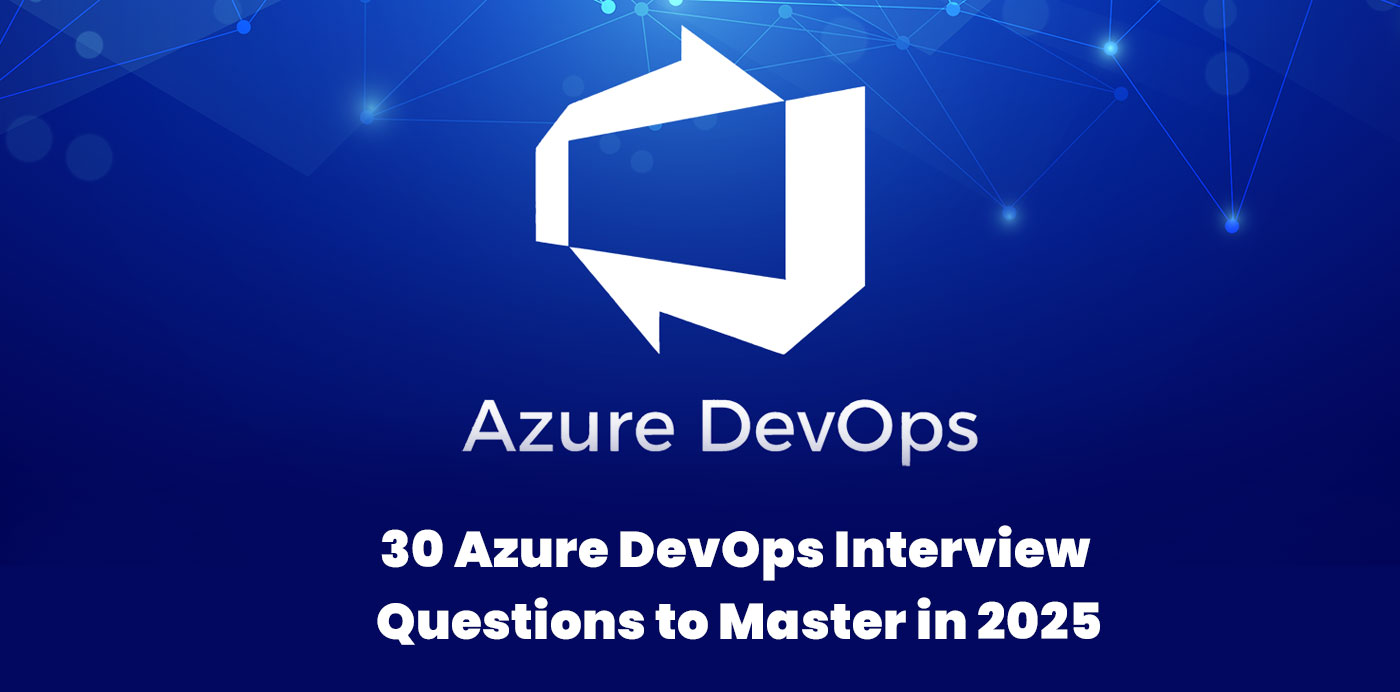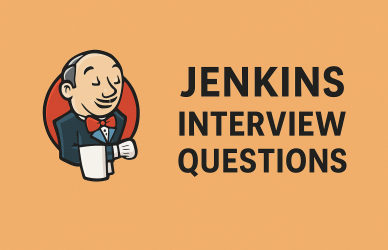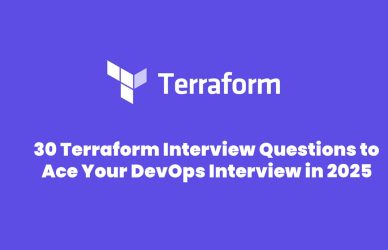his comprehensive guide is designed for DevOps professionals preparing for roles that leverage Azure DevOps in 2025. It features CI/CD pipeline setups, YAML examples, Azure Boards, security best practices, and troubleshooting strategies. Optimized for keywords like “Azure DevOps interview questions” and “Azure CI/CD interview”, it also includes a downloadable YAML pipeline template and links to live job listings on www.clouddevopsjobs.com.
🚀 Introduction: Why Azure DevOps Is a Must-Know in 2025
With Microsoft Azure becoming the second-largest cloud provider globally, companies are rapidly adopting Azure DevOps for managing end-to-end software delivery. Whether you’re preparing for a role in DevOps, SRE, or cloud automation, understanding Azure DevOps tools is critical to acing your next interview.
Here are the top 30 Azure DevOps interview questions and answers for 2025, complete with hands-on YAML pipeline examples and real-world scenarios.
🔧 Section 1: Azure DevOps Fundamentals
1. What is Azure DevOps?
Azure DevOps is a SaaS-based DevOps platform from Microsoft that provides tools for:
- Source control: Azure Repos
- CI/CD: Azure Pipelines
- Agile project management: Azure Boards
- Artifact management: Azure Artifacts
- Testing: Azure Test Plans
2. What services are included in Azure DevOps?
- Azure Repos – Git-based version control
- Azure Pipelines – CI/CD automation
- Azure Boards – Agile work tracking
- Azure Artifacts – Package hosting
- Azure Test Plans – Manual/exploratory testing
3. What is the difference between classic and YAML pipelines?
| Classic Pipelines | YAML Pipelines |
|---|---|
| GUI-based | Code-based |
| Less portable | Version-controlled and reusable |
4. How do you organize work with Azure Boards?
- Work Items: Epics, Features, Stories, Tasks, Bugs
- Views: Kanban, Sprint Boards
- Tracking: Dashboards, Queries
5. What is a build pipeline vs. release pipeline?
- Build Pipeline: Compiles and tests code
- Release Pipeline: Deploys to environments
✅ Modern practice: Combine both using multi-stage YAML pipelines
⚙️ Section 2: Azure CI/CD Interview Questions (YAML + Examples)
6. How do you create a YAML pipeline in Azure DevOps?
- Navigate to Pipelines > New Pipeline
- Choose your Git repo
- Select YAML and create
.azure-pipelines.ymlfile
7. Provide a simple YAML pipeline example for a Node.js app
yamlCopyEdittrigger:
- main
pool:
vmImage: 'ubuntu-latest'
steps:
- task: NodeTool@0
inputs:
versionSpec: '18.x'
displayName: 'Install Node.js'
- script: npm install
displayName: 'Install dependencies'
- script: npm test
displayName: 'Run tests'
8. How do you use variables in Azure Pipelines?
yamlCopyEditvariables:
buildConfiguration: 'Release'
# Use it as:
# $(buildConfiguration)
9. What are templates in Azure YAML pipelines?
yamlCopyEdit- template: templates/build.yml
parameters:
environment: 'staging'
Templates help reuse common build/deploy logic across pipelines.
10. How do you trigger a pipeline on PR?
yamlCopyEditpr:
branches:
include:
- main
🔐 Section 3: Azure DevOps Security and Troubleshooting
11. How do you secure secrets in Azure DevOps?
- Store secrets in Azure Key Vault
- Use AzureKeyVault@2 task
- Use secret variables in variable groups
- Mask sensitive values in logs
12. How do you troubleshoot a failing Azure pipeline?
- Check error logs in Jobs and Steps
- Set
System.Debug: truefor verbose output - Clean checkout and retry
- Validate service connections
13. What is a service connection in Azure Pipelines?
Used to authenticate with:
- Azure Subscriptions
- GitHub
- Docker Hub
- Kubernetes clusters
14. What is an agent pool?
A logical grouping of build agents (Microsoft-hosted or self-hosted) that run your pipeline jobs.
15. What is a deployment group?
A collection of target machines for agent-based deployments (e.g., to on-prem servers).
📦 Section 4: Scenario-Based Azure DevOps Interview Questions
16. How would you set up CI/CD for a microservices project?
- Multi-repo triggers
- Modular YAML templates
- Deploy via AKS or App Services
- Track with Azure Boards
17. How do you deploy to Azure App Service?
yamlCopyEdit- task: AzureWebApp@1
inputs:
azureSubscription: 'My Azure Service Connection'
appName: 'my-app-service'
package: '$(System.DefaultWorkingDirectory)/**/*.zip'
18. How do you implement canary deployment?
- Use deployment slots
- Route traffic using Azure Front Door
- Monitor and auto-promote on success
19. How do you roll back a failed deployment?
- Re-deploy last good artifact
- Use approval gates
- Add manual intervention tasks in YAML
20. How do you manage pipeline environments?
- Use environment-based parameters
- Define variable groups per env
- Use checks and approvals for prod
🔄 Section 5: Azure DevOps Integration and Ecosystem
21. How do you integrate Azure DevOps with GitHub?
- Connect GitHub as a repo source
- Use
checkout: selforgit://syntax - Install Azure Pipelines GitHub App
22. How do you integrate testing into pipelines?
- Run unit tests:
dotnet test,npm test, etc. - Publish results with
PublishTestResults@2 - Use
PublishCodeCoverageResults@1 - Load testing via Azure Load Test or JMeter
23. How does Azure DevOps support containerization?
- Build containers using
Docker@2 - Push to ACR (Azure Container Registry)
- Deploy to AKS or Azure App Service for Containers
24. What’s the role of Azure Artifacts?
Hosts private package feeds for:
- NuGet, npm, Maven, Python
- Manage versions, scopes, retention
25. What are pipeline stages and jobs?
| Term | Meaning |
|---|---|
| Stage | Logical grouping (e.g., Build, Deploy) |
| Job | A unit of execution inside a stage |
| Step | Individual task/script |
Stages can include conditions, approvals, and dependencies.
📊 Section 6: Governance, Reporting, and DevOps Culture
26. How do you enforce quality gates?
- Branch Policies (min reviewers, build pass)
- SonarCloud or Checkmarx for static analysis
- Pre-deployment approvals
- Release gates (based on metrics or testing)
27. How do you use dashboards in Azure DevOps?
- Velocity charts
- Burndown charts
- Pipeline health
- Work item and test progress
📌 Dashboards can be customized and pinned from Azure Boards and Pipelines
28. What KPIs should you track?
- Deployment frequency
- Lead time for changes
- Change failure rate
- MTTR (Mean Time to Restore)
- PR cycle time
- Code coverage %
29. What’s the difference between Azure Repos and GitHub?
| Feature | Azure Repos | GitHub |
|---|---|---|
| Hosted By | Microsoft (Azure DevOps) | Microsoft (GitHub) |
| CI/CD Tooling | Azure Pipelines | GitHub Actions |
| Best For | Enterprise projects | Open source, community |
| Access | Azure AD | GitHub ID / SSO |
30. What certifications validate Azure DevOps expertise?
- AZ-400: DevOps Engineer Expert
- AZ-104: Azure Administrator Associate
- AZ-204: Azure Developer Associate
- Terraform Associate (HashiCorp) – complementary
🎁 Bonus: Downloadable Azure DevOps YAML Template
👉 Download the ready-to-use YAML pipeline for Node.js/React apps
Includes:
- Linting & testing
- Build & artifact publish
- Azure Web App deployment
- Custom secrets & variable groups
💼 Explore Azure DevOps Jobs at CloudDevOpsJobs.com
Ready to apply your Azure DevOps skills?
🌐 Visit www.clouddevopsjobs.com to browse:
- Azure DevOps Engineer Roles
- CI/CD Automation Experts
- Release Pipeline Managers
- Remote and hybrid jobs
📄 Upload your resume and set custom job alerts!
📣 Final Thoughts
Whether you’re a seasoned engineer or just starting out in the Azure ecosystem, mastering these Azure DevOps interview questions will help you succeed in technical screenings, practical demos, and whiteboard discussions.
👉 Share this guide with your network using:
#AzureDevOps #AzureCI/CD #DevOpsInterview







